 "Did I waste the last two years of my life?" Earlier this week, in a conversation with my spouse, Michelle, I verbalized this question, and it's something that I've been feeling for many pandemic months. Now, I don't hate my job. In fact, I love it. I've loved working with the students at Capital and Trinity. I've loved coaching their faith, forming their vocations, accompanying their journeys, learning from their wisdom. I've loved the last two years of my life. But I was planning for a world that no longer exists. All the work that I did was based on developing students to live in a world that died on March 3rd. That's the date that Capital suspended in-person instruction and began months of COVID-19 quarantine. In your own lives, that date varies slightly, but for each of us, there's a date, a watershed moment, where what came before is gone and what will begin to take shape. In those first few months, so many conversations talked about "when this is all over" or "after we get back to normal." Many people, myself chief amongst them, imagined a relatively hasty return to the way things were before. Ah, the last naiveté of my dying youth. As the months waned on, planning conversations changed. The first change was the timeline, where we all realized no swift end was coming to this strange season. Yet, under that, we still assumed a former normal would once again become an eventual reality. The world hadn't changed forever. It was just a temporary transition away from the status quo. Those plans soon yielded to an emerging realization of reality: these weren’t temporary transitions. These were tectonic transformations. The pandemic changed the landscape forever. Not just for campus ministry. Not just higher education. Not even just in the U.S. The coronavirus has forever changed God's green earth. If all I was doing was educating students for a world that will never again exist, did I waste the last two years of my life? Planning for a world that won't exist felt, for a moment, like failure. Not because the training done was poor, or the skills developed were useless, but because they were directed at a specter we believed would take shape when, in fact, it will always remain a ghost. The moment I began to reflect on the students who made those last two years so enjoyable, along with the colleagues who made them so vibrant, a new awareness dawned. Though the world we anticipated will never come to be, the years were not wasted, for the people we invested in are still here. The future will not be what we imagined it, but it will be what we make of it. The last few years of ministry, teaching, leadership, learning, exploration, identity development, vocational formation... none of it is wasted. Surely, the utility of what we've done has changed. Yet, an awareness of God's presence in the world matters just as much, if not more, in an environment transformed by coronavirus. A conviction that we're beloved by God, not because we've earned it but because God's chosen us, is a beautiful reminder in an era where how we earn incomes and perceive value has drastically changed. Equipping students to explore their vocations - the areas of life that are meaningful and life giving work for the world - rather than simply determine a career path is more necessary than ever, since how we're making meaning as a community and the ways we're finding abundant life are both in transition. Not to mention, the last two years of my life weren't just found in work. They were found in a healthier marriage, the discovery of new friendships, the development of new skills, the discernment of my own values, the decisions to persevere in the face of a hard season even before COVID-19 exponentially changed the game's difficulty level. I didn't waste the last two years. I just imagined that the next two years would look so very different. What I'm feeling isn't grief for the past. It's grief for the future that will never come to be. And it's also a bundle of commingled anxiety and hope for the future that is to be. I imagine the same is true for many of you. You may wonder if you've wasted the years of your life just before COVID, building for a now impossible future. But hear me clearly: You did not waste your life. You did what every reasonable person would do - prepare for the future that most all of the world imagined would come true. And, even though that's not what is in store for us, you gained skills and experiences and relationships that will serve you well in the new era that's being birthed in our midst. Of course, we must change our expectations. We must reshape our imaginations. But we can also give thanks for our past, for the work that was done for a world that won't exist, for that effort will also build the world that we live in tomorrow.
1 Comment
When reflecting on key moments in history, people often ponder the "What If?" questions. You know them well. Questions like:
When we look back on history, we see the turning points from which we benefit, and want to believe we'd support them in the moment. What the last few days have revealed, and not for the first time, is that the reality of social change is much more complicated than our historical pictures and the reality of our support is much more muddy than we'd like to admit. Especially for the privileged classes in the above situations. Men. White men. Christian white folx. Wealthy (meaning, middle class or more access to capital) Christian white folx. The reality of those questions lie at our feet because we're the ones most often benefitting from the status quo. But I'm convinced that the "What If?" question just isn't helpful. You know right now the answer to those questions by your reactions and responses recently. Whatever you did or didn't do in the past week is likely what you would have done in those other situations, because let's be clear: The danger for supporting Dr. King's civil rights agenda, anti-fascism in Germany during 1930s and 1940s, and women's empowerment in the U.S. in the 19th and early 20th centuries was no less dangerous and certainly no less complicated than the movement to combat racism and state-sanctioned violence today. Now, before you get too offended, I don't mean that as an assault on your character if you weren't in the streets this week. In fact, there are tons of ways to support. I recently spoke to one woman who admitted that fear (COVID and potential violence) kept her from the streets but she supported movement through publishing a website with frequently updated resources through her faith community. I met others this week who didn't march, but came instead as legal observers, as medics, as counselors and pastoral caregivers. I know people who prayed in vigil during each of the demonstrations in their homes and church buildings, who directed traffic, who called public officials, who shared social media posts. For some, health realities, family responsibilities, and dangers from work kept you from being public, but you were subservience coconspirators. For others, you just didn't show up at all. If you're offended by that, then you're not really mad at me. You're upset with something inside you telling you something should change that you just can't change. The real danger of asking "What If?" is that we can cast ourselves as heroes in stories that aren't our own and in contexts where, in all honestly, we have no business being the heroes. Especially when we look at the evidence of the past and present ways that white folx with privilege have and have not acted. Odds are, whatever you're doing right now is what you would have done before this moment. What I'm saying is, since your level of involvement in today's movement likely reflects what it would have been before, you know the answer to the question "What If? We should stop asking that question. But that doesn't mean we should stop asking all questions. The more helpful question, though, is "What's Next?" What's next for me? What's next for my community? What's next for our world? What's my responsibility and level of commitment to making what's next life-giving for everyone and not just a privileged few? Asking "What's Next?" turns our attention away from the things we can't change about ourselves to the things we can change about ourselves, our behaviors, our beliefs, and our priorities. Because, if you're afraid that you didn't do enough this time, there's more to be done next time. If you're convicted that something must be done but you can't join the protests in person, that doesn't mean there's nothing you can do. There are organizers all over that would take your support through communication, through prayer, through material and cash donations, through your skills. Movements need graphic designers and nurses, editors and logistics personnel. Movements need mental healthcare, spiritual support, musicians, attorneys, and all sorts of other folx. Movements need you. I recently saw a social media post that, with a similar sentiment, concluded something like this: "We all have your lanes. There's no shame to staying in your lane. Just keep your foot on the gas." That's the beauty, the import, of the question "What's Next?" It looks to the future in light of the past. It doesn't ignore what came before, but it also admits that we can't change history. We can, though, change our future. To focus on what's next is to plant yourself in the emerging reality. Of course, "What's Next?" is the more difficult question. It's also the question that is still, as yet, unanswered. Of the options, it's the only question where we can truly influence the answer. When you ask "What's Next?" don't be ashamed of the gifts you have, the abilities you possess, or the priorities in your life - unless, of course, your priorities are racist, sexist, bigoted, or xenophobic - then admit your guilt and change your priorities ASAP. Instead, turn toward the future and keep your foot on the gas. Make the changes you want to see in your life, in our environment, in God's world. And if you're really stuck on the "What If?" Question, consider this: If you really think you would have marched with Dr. King but haven't marched with Black Lives Matter, what's next is the march or demonstration that is almost certainly happening in your area today. If you really think you would have spoken out against fascism in Germany during the 1930s but haven't said anything to your friends or family yet about the current trajectory of our government, what's next is a conversation that you need to have. If you really think you would have organized for women to access the right to vote, what's next is to join the movement to ensure Black and Brown lives truly have a right to live. If you're unsatisfied with what you've done thus far, there's always a chance to change that with what's next. Ask yourself, "What's Next?" Then make that a reality. One unexpected learning in the fallout of COVID-19 has been the insight into leadership offered by so many varied responses to the crisis. Various institutions and their leaders responded differently. Companies, colleges, and communities have acted in ways both admirable and deplorable. Rather than call out the terrible - after all, you have the internet and can find them easily enough - below I've shared a learning about leadership connected to a powerful, positive example of commendable leadership.
In calling these "leaders worth following," I mean to say at least two things. One, there are people who claim to be leaders that aren't worth following. That doesn't mean they have no worth or integrity. It does mean that there are people in the world who claim leadership who aren't actually suitable leaders. Following such people is unnecessarily risky. Relatedly, we all choose to follow someone or something. Simply put, you should make this choice wisely, because yotoo have integrity and worth. You shouldn't waste your energy following leaders whose selfishness or foolishness endangers you or the people you're called to serve.
From Online Teaching to Digital Formation: Lessons in Pedagogy from the Season of COVID-194/11/2020  The best online teaching utilizes web-based tools to create points of contact that foster digital formation. The best online teaching utilizes web-based tools to create points of contact that foster digital formation. Serving as both a campus pastor and an adjunct instructor, I know that web-based teaching can feel disconnected from the students I'm called to serve. I'm also not satisfied with that reality. Thankfully, neither are my students or colleagues. Together, we're learning how to better design our web-based content to move from online teaching to digital formation. The distinction I’m making here is this: formation implies teaching that is received and incorporated into the development of a student’s knowledge, skill, vocation, or identity. All formation includes teaching, but not all teaching results in formation. My desire to teach at the college level came from a yearning, even a mission, to connect with students in these critical years of identity development and vocational exploration, empowering them with the tools of reason, wisdom, and knowledge, that they might find not just lucrative careers, but rewarding lives. In other words, I desire to teach in a way that promotes formation. Online education doesn't change that intent, but it surely changes the form. These last few weeks of web-based learning have both reaffirmed some lessons and brought new insights. I share just a few here to continue the conversation around how we can best serve our students as educators in an era COVID-related online education.
In all of this, it’s important to remember that alternative delivery methods aren’t lesser delivery methods. We may, however, have less skill at these methods, which requires more of us as educators to learn and employ new ways of forming our students. That, then, is the key to doing this all well. Simply taking all of our in-person content and deploying it in the easiest fashion (for us) on the web can be called online teaching, but it doesn’t necessarily promote digital formation. In periods of crisis - and indeed, in all eras of education - we ought to design courses in ways that promote true formation. The best online teaching utilizes web-based tools to create points of contact that foster digital formation. The above suggestions can enhance our practices in ways that it promotes digital formation through our delivery of online teaching. 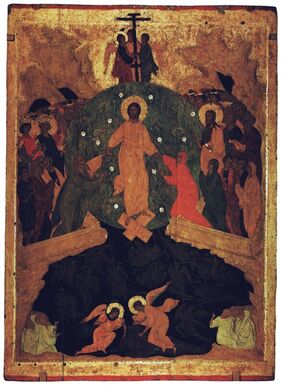 Dionysius, Descent Into Hell, at the Muzeum Rosyjskie w Leningradzie in Arkady, Warszawa. Dionysius, Descent Into Hell, at the Muzeum Rosyjskie w Leningradzie in Arkady, Warszawa. Growing up going to church camps across the state of Ohio, I know a plethora of silly songs intended to teach core faith values and central themes of Christianity. Some include goofy sounds, bodily motions, or absurd storylines. Others, more straightforward, rely on catchy melodies and repetitive phrases. The pedagogy, the teaching intent, is to gamify faith formation, to make the exploration of our faith's stories, scriptures, and beliefs, accessible and fun. On a Day Like This is one that's remained ingrained in my brain for nearly three decades. Full of onomatopoeia, hand signs, and memory games, the core lyrics repeat: On a day like this, on a day like this, on a day like this, Oh I need the Lord to help me. The central reminder, of course, is that no matter what the day has brought us, good or bad, celebration or sorrow, we need God's presence, support, and wisdom. I'm struck with our need of God, particularly today, Holy Saturday. This is the day when Christ's death seemed most permanent. The morning after his interment, the disciples awoke to, well, nothing. To the absence of their teacher and friend. On a day like this, I need the Lord to help me. Also called the Great Sabbath, Holy Saturday is the day when, once again, God rested, calling upon that first Saturday in Eden. But this rest, rather than a completion of good work, surely seemed a negation of God's work. After all, God's Son was slain and seemed impossibly defeated. On a day like this, I need the Lord to help me. On this day, when nefarious politicians and corrupt religious leaders overwhelm not just the good of the people but seem to render God's will moot, it's natural to feel lost, abandoned, alone. It's natural to wonder what's next, to ask what God's plan really was, when the plan certainly seems defeated. It's natural to cry Oh I need the Lord to help me! But what do we do with a God who is in the grave? One of the reasons I cling to the name Holy Saturday is that, before the Easter Vigil, usually begun at or after sunset, Jesus was still, in fact, active. The above icon, from Dionysius (or his school of iconographers), reveals what God did on a day like this: the Harrowing of Hell. Even the Great Sabbath wasn't truly rest for God, for Christ's absence in our world meant Christ's presence in Hades, where he brought liberation to all those awaiting the freedom of God's presence. On a day like this, when God seems entirely inactive, God is acting on our behalf, liberating all humanity from the hells that bind us. When God seems dead, instead God is planting life in the house of death. When God seems absent, God's presence goes even to the places where the holy seems impossible. That's the shocking mystery of the Great Sabbath. All creation rests because, well, work now seems futile. Yet, even as the entire cosmos takes pause, God's at work, on a day like this, helping not just me, not just you, but all creation - even hell itself - find a way to abundant, eternal life. Thank God for a day like this. Joel 2:12 Yet even now, says the Lord, return to me with all your heart, with fasting, with weeping, and with mourning. To be clear from the start, this is not an article arguing you shouldn't utilize digital Eucharistic practices. Nor is it a piece contending you should provide digital Eucharistic opportunities. Rather, it's a reflection on what I've learned thus far in a Lent almost entirely without Eucharist. And without Coke Zero. When this Lent began, I thought the most difficult fast I would be undertaking was my discipline of forgoing all diet soda during the 40 days of preparation for Easter. That was before the coronavirus news fully set in to the psyche of the U.S. Since then, I've fasted from most physical contact and in-person social engagements. I've fasted from the gym, from dining in restaurants, from the freedom to go wherever I want, whenever I want. I've fasted from my normal routine. And so have you. Due to the deadly potential of the COVID-19 pandemic, we've been forced to fast from so much. It's surreal to think that, when my diet soda fast began on Ash Wednesday, I was with a number of Capital University preseminary students in Florida for a ministry immersion trip. How strange to consider that, just a few weeks ago, interstate travel was a given. Now, we're restricted from traveling anywhere beyond the bounds of absolute necessity (though, admittedly, we have incredibly loose definitions of "essential" work and activities). What a difference a few weeks can make when the lives and livelihoods of billions of people are at stake. One of my favorite Lenten nuggets of knowledge is that Sundays are not properly part of Lent. That's why, between Ash Wednesday and Easter Sunday, there are forty-six calendar days, even as the season of Lent only has forty days. The difference between the two numbers is each Sunday, which is a little celebration of Easter. The fasts of Lent are not required during the Sundays that interrupt the season. That's why, each Sunday, I've been fortunate to suck down the sweet nectar of Coke Zero, Diet Vernor's, Fresca, and others. It's a delicious reprieve amidst what has become the simplest fast of the season. My daily soda consumption during the rest of the year is, well, significant. So kicking it entirely out of my life six days a week has been rough. An incredibly first world kind of rough, but rough nonetheless. Each Monday, my taste buds still carry a hint of sucralose sweetness, so my yearning is strong but full of reminiscent thanks. By Wednesday, I'm grumpy, reminding my wife that sparkling water "tastes like butt." When Friday rolls in, I can see the caramel-tinted light at the end of the weekend's tunnel, so I hydrate expectantly in the hopes of Sunday's return to Coke Zero nirvana. I've learned a surprising amount about Eucharist, and about the God who is present in that holy meal, from this time of unexpected fasts. Yet, it's not the words of Jesus that ring in my ear, nor Paul's recollection of the eucharistic feast. It's Joel, the prophet through whom God beckons to the people, "return to me with all your heart, with fasting, with weeping, and with mourning." No, God does not rejoice in our tears, but God does delight in our authenticity. My time away from diet sodas doesn't make me weep, and to call my yearning for the fizzy sweetness "mourning " would be hyperbole to the max. In the obvious sense, a desire from Coke Zero is nothing like our desire for God. Indeed, in this Lenten fast, I've noticed something deeper than in years past. While I want diet soda worse and worse as the week rolls on, each Sunday, my Coke Zero swig is sublime. Yet, I notice I've loved diet soda less and less. I no longer relish in its taste. I no longer feel the need to have constant access to the ice and fizz. My time away from diet soda makes me want it more, until the reality comes, and then its true value is revealed. It's good, but it's not that good. What Lenten fasts intend to teach us is a shadow of God's holy fast. Our preparation for God, this time when we see in a mirror dimly, will not end with similar disappointment. Rather, the first deep drink from the well of everlasting life will fill us to the brim. It will be no less sweet to commune at Christ's eternal feast, to sip from the river that runs through God's holy city, to eat from the tree at the center of that city. We await God's ultimate return, and what we find will not leave us wanting or unimpressed. This, I feel, is what I'm learning from the unintended eucharistic fast so many of us are on. It's not just the texture of the wheat grains, the smoothness of the fermented grapes, that will one day cross these lips again. It's the promise of union with God and with all the saints who partake of the eternal feast, that signifies this meal. Without the COVID-19 "stay at home" order in Ohio, I might not realize how I can yearn even more for eucharist than I do for modern extravagances. I might not comprehend the powerful draw of the sacrament, one which reminds me of my full humanity and brings the fullness of divinity deep into me. It's possible to yearn for something quite mundane in ways that are similar to yearning for something holy. What's different is the experience of satisfaction. Time without Coke Zero - and all other diet pops - has taught me that they are, in fact, unnecessary. Time without the Eucharist has taught me how essential it is. I am not myself if I am not united with God and God's people. Our communion is only a foretaste of the feast to come, but that is more taste than our worldly foods could ever conceive. Even Coke Zero pales in comparison to the tastes of eternity, bread of heaven, cup of salvation, feast of God's victory. That's what I've learned from this Lenten fast. It's a healthy reminder that our Lenten disciplines do matter because, with reflection, they point us beyond the mundane and into the sacred. And so I wait, in great expectancy, first for the Eucharist, and then for the everlasting feast.  So you, and many others, are now worshipping digitally because of an order from your state to Shelter in Place, Stay at Home, Quarantine, or my personal favorite, Hoosier Hunker Down. Well done, Indiana. Probably not just worship, either. Small group meetings and Bible studies. Council meetings and youth group activities. Much, perhaps most, of this life is digital right now. Soon, though, the novelty may wear off. Now that you've been doing it for a few weeks, there's a danger of both losing connectivity to one another as well as the commitment to continuing this practice in these limited ways. How can you foster feelings of connection with God, with your community, and with the worship experience? How can worship remain a priority for you not just in theory, but in practice? Preparation here now matters more than ever. Many congregations, when they gather, hear a leader say "Prepare your hearts and minds for worship." Now, though, we're called beyond hearts and minds. We're called to prepare hearths and selves, the physical spaces of our homes and the bodies we bring to digital worship. Below are 5 suggestions for preparation to magnify your experience of digital worship. First, though, a disclaimer: This isn't advice for how to create the best technological experience. There's value in the right sound settings, turning your microphone off, and the like; this, rather, is about the space in which your technology is set and how to more fully engage worship in that place.
Do you have other ideas for how to best prepare for digital worship? Share them here in the comments or on social media. Be sure to tag @FriarTuckTweets on Twitter, @LutheranFriarTucker on Instagram, and @Drew Tucker on Facebook. 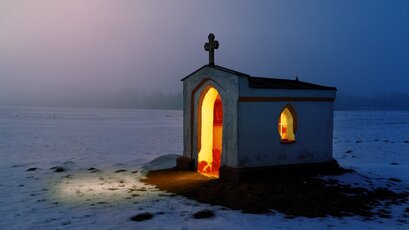 As you're probably aware, colleges and universities across the country are moving to "online delivery" of education. In other words, classes will temporarily meet via software like Zoom or Skype for Business until the time comes that COVID-19, aka coronavirus, is no longer at a pandemic level. Most times, this also includes the cancellation of all events on campus, and in some extreme cases, closure of residence halls as well. At Capital, we're keeping dining and housing up and running to ensure all students have access to food and shelter; however, we've cancelled all official gatherings scheduled to happen on our campus, whether hosted by student organizations, university offices, and outside organizations. We just announced this decision over 24 hours ago, and already I've had dozens of conversations with people who feel increasingly isolated by this necessary move to isolation. So, rather than simply suspend worship until further notice, we've decided to host online versions of worship during our regularly scheduled times. Though we might feel like we're all alone in our worship, like the tiny chapel built for one above, one of the blessings of the digital age is that this restriction on gathering mustn't include absolute isolation. We can, and should, connect with our siblings in Christ to worship. We can, and should, continue our Lenten journeys. We can, and should, provide vital precautions to prevent infecting the most vulnerable people in our communities, as well as the very vulnerable neighbors we've never met but will come across in the grocery store, on the bus, or at work. So, we worship in this way temporarily, with the grand hope of returning to worship together in the same room. Until then, our small worship spaces are bound together by the Holy Spirit and the World Wide Web, raising a chorus to God of faith, hope, and love. I'm thankful to Capital junior Nicky Gutierrez, who was planning to preach this sermon at Candlelight, our Thursday night worship service, and instead worked ahead to record it so we can place it here and share it during worship on Facebook Live at 9:09PM on March 12th. If you've come across this page, you've come to the right place. Give it a listen.
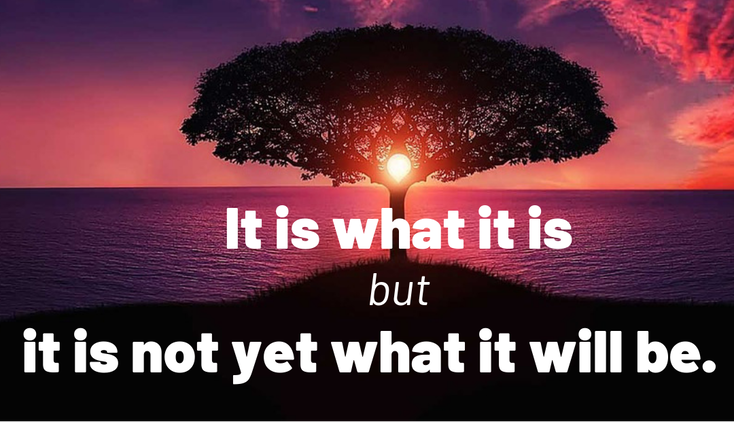 Recently, as I spoke with a student about a tremendous amount of grief in their life, these clarified for us. People so often say "it is what it is" as a kind of concession to the factors that we cannot control. It is what it is because accidents happen. It is what it is because global climate change seems inevitable, It is what it is because illness and death eventually touch all human creatures. This is most certainly true. Yet, just because something is a certain way now does not dictate what it will be tomorrow. Today, my marriage is what it is, though tomorrow it will be what my spouse and I make it together. The climate crisis is what it is today, though tomorrow it can change depending upon our decisions and behavior. Today, your grief is what it is. Tomorrow? It can be something different. When I work with college athletes, one of the things I say over and again is this: control what you can control. You can't force your teammates actions, but you can do your very best to set them up for success. You can't predict the next pitch, but you can practice hitting fastballs and curves, sliders and changeups, even knuckleballs. In short, we can control our response. We can be proactive by preparing for any number of potential reactions. This is true in sports, but it is also true of life writ large. When we stop with "it is what it is" we run the risk of giving up too much control. Now, we don't control everything. In fact, we don't control most things. But we do have some authority over our own lives, some capacity to influence our behaviors and those immediately around us. We can be proactive in developing healthy responses so we avoid reacting in unhealthy ways. Indeed, there's great value in the simple truth that "it is what it is." An apple is, after all, an apple. Death is, sadly, a constant in life. Illness is, too frequently, inexplicable and indiscriminate. Failure happens, as do the plethora of demands laid upon so many folks in lives where work, family, and civic demands leave hardly any time for self consideration, much less self care. Admitting the present reality is healthy differentiation. Yet, the present is not our only reality. It is simply our current one. We each have a past that contributed to the present, especially our response to our present circumstances. Moreover, we each have a future that we can shape. Whatever today is, it is not what tomorrow will be. Tomorrow will be what we make it with one another. This is essentially a claim of relentless hope. There's always unrealized potential, which means there's always room for things to get better. Give yourself the space to see the world both as it is now and as it might be. And then, when you're ready, start making the necessary changes to have the world become what you want it to be. Below is the letter that I sent to my bishop in the Southern Ohio Synod regarding Trustworthy Servants. I have great trust that she will receive it and consider it seriously. I also know many of my colleagues across the church do not have the same trust in their leadership. Therefore, I share this publicly as a matter of record, particularly for those who feel their concerns have not been heard. You're welcome to critique and to share as you see fit.
Good morning, Bishop Dillahunt, I’m joining my voices to the others with feedback on Trustworthy Servants. First, let me share my affirmation that (1) such a document is appropriate because (2) it is proper for us to have clear guidance and specific expectations of rostered ministers, particularly because (3) people offer church professionals, particularly pastors, deacons, and bishops, rarified authority, as does the church in the processes of ordination and consecration. In general, I found Trustworthy Servants itself an improvement upon V&E, though it’s notable that references to sex and sexuality outpace references to financial and physical health, which are aspects of wellness Jesus spent much more focus on in his teaching and healing ministries. I’m not suggesting a necessary decrease in conversation about sexuality. Rather, if sexuality requires that much attention, then we should certainly increase and clarify our attention around other aspects of wellness that receive specific attention in the Gospel manifest in the person of Jesus. It’s also entirely possible that I find this a generally amenable document because I’m the picture of privilege in our church: white, solidly middle class, with no education debt, cisgender and male, with all the authority given to a pastor who serves in one of the rarer calls in our church, college chaplaincy. Other perspectives, especially those from minoritized and marginalized voices, have already detailed more specific issues with the content of Trustworthy Servants, and I commend all of those to you as worthy of consideration. My most immediate issue is that V&E became a weapon of abuse toward the LGBTQIA+ community, something for which the bishops took responsibility and offered apology. I am encouraged by that move; I am disheartened that, with the exception of one out member of the LGBTQIA+ community who is a member of the Conference of Bishops, it appears that no other queer folx were involved in the creation of Trustworthy Servants. How can we fix a problem of oppression if we do not inherently include, from the earliest stages of the process, multiple perspectives of those folks who were harmed by the dysfunction of the earlier document itself and its application? I contend we cannot. So, even though my sense of Trustworthy Servants is that it could be a helpful tool, I encourage you and the rest of the Conference of Bishops not to recommend it for consideration by church council. Instead, I ask that you, alongside the Domestic Mission unit, publicly incorporate LGBTQIA+ representatives in either (1) the editing of Trustworthy Servants if possible, or (2) the creation of a new document, if necessary. Some might argue that the product is more important than the process. Others would argue that the process is more important than the product. I contend, rather, that the process is the product. A process that lacks expansive inclusion of LGBTQIA+ perspectives cannot and has not produce a document worthy of use in a church that purports to include LGBTQIA+ people. Therefore, until we produce a product that includes many minoritized and marginalized voices from the start, including but not limited to multiple representations of folx from the LGBTQIA+ community, I cannot in good faith commend Trustworthy Servants as document worthy of our church, our people, or our rostered ministers. I am open, if you would find it helpful, to further discussion. I am thankful for your service as our bishop in Southern Ohio and am grateful for your continued ministry among us. Grace and peace, Pastor Drew |
AuthorSimultaneously a sinner and a saint. Archives
September 2020
Categories |
||||||
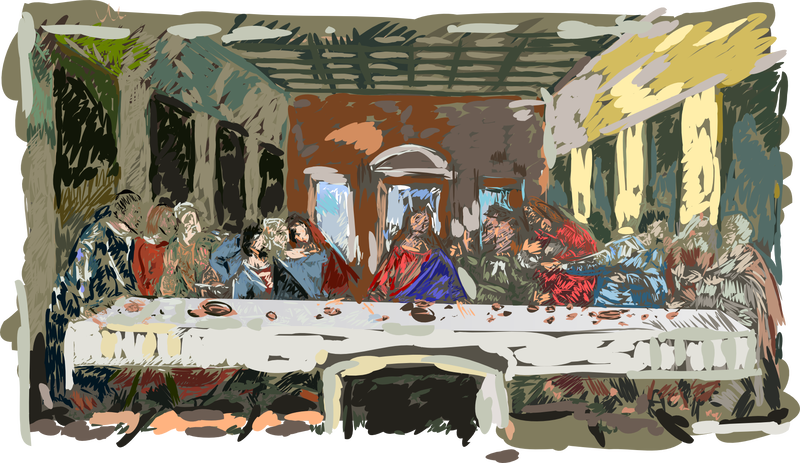
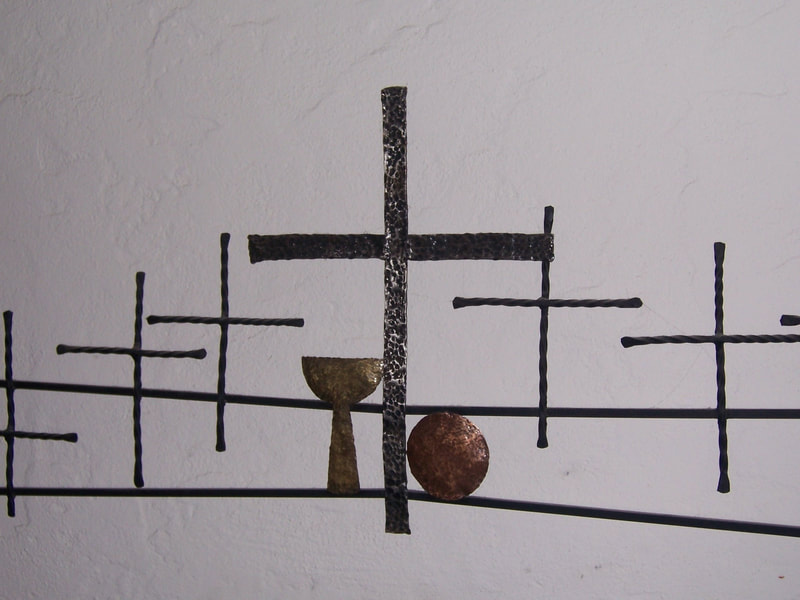
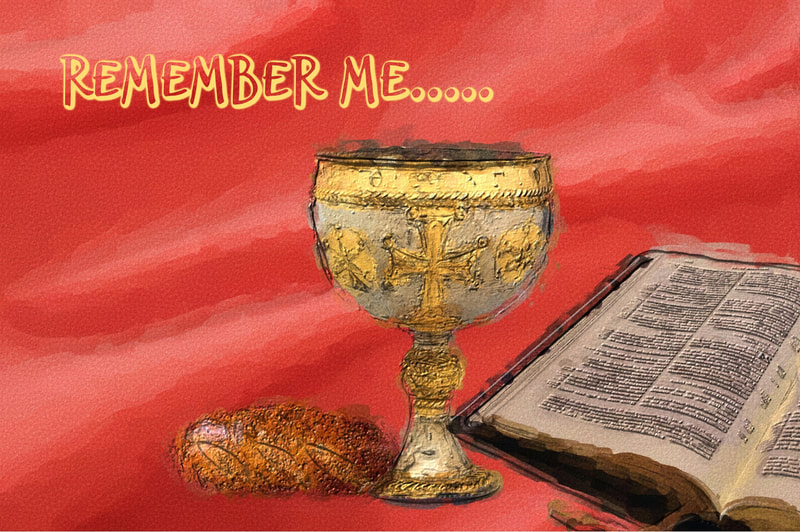
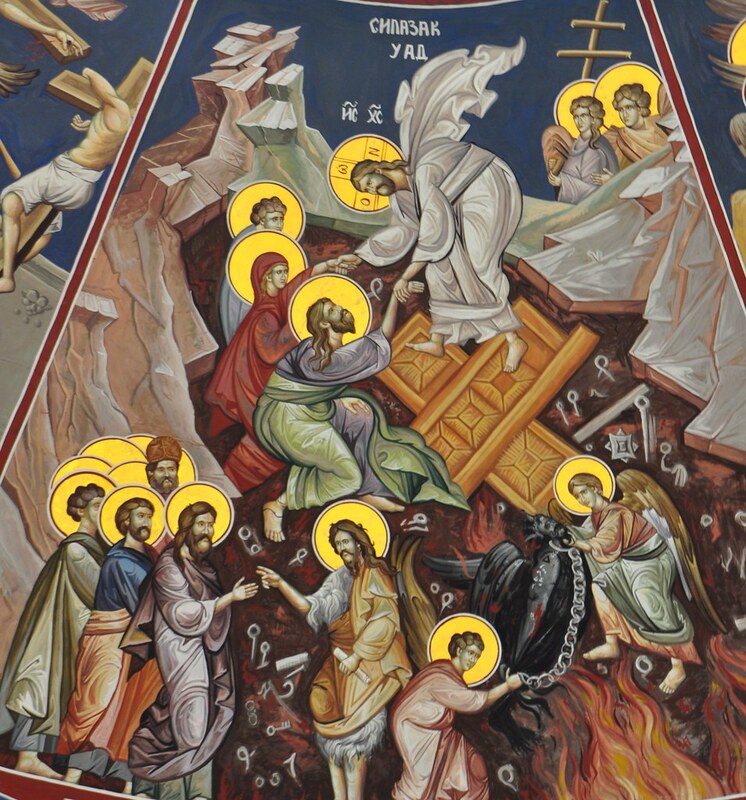
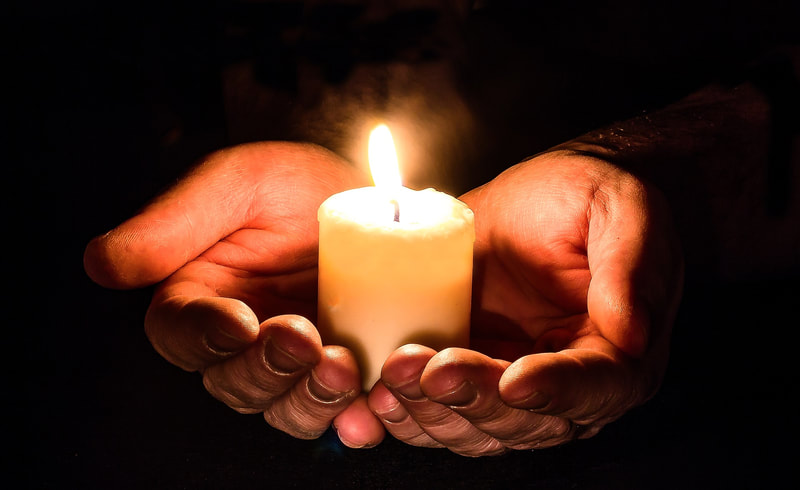
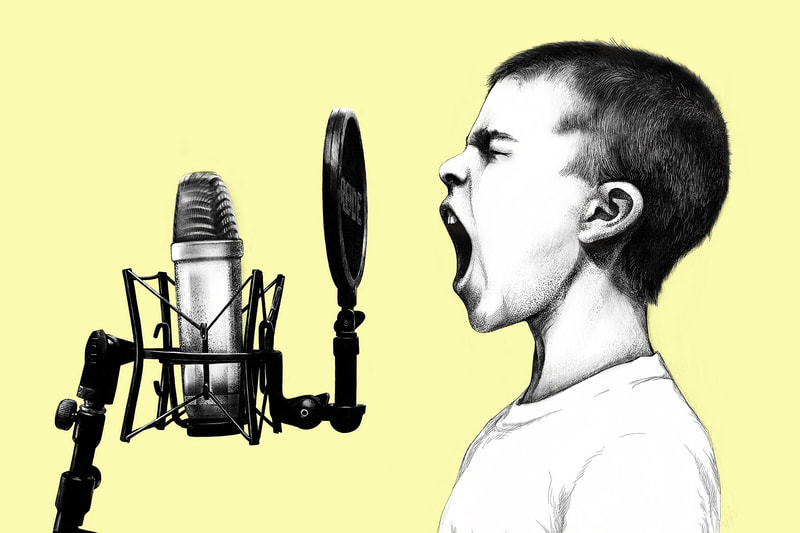
 RSS Feed
RSS Feed